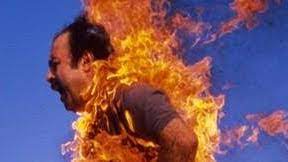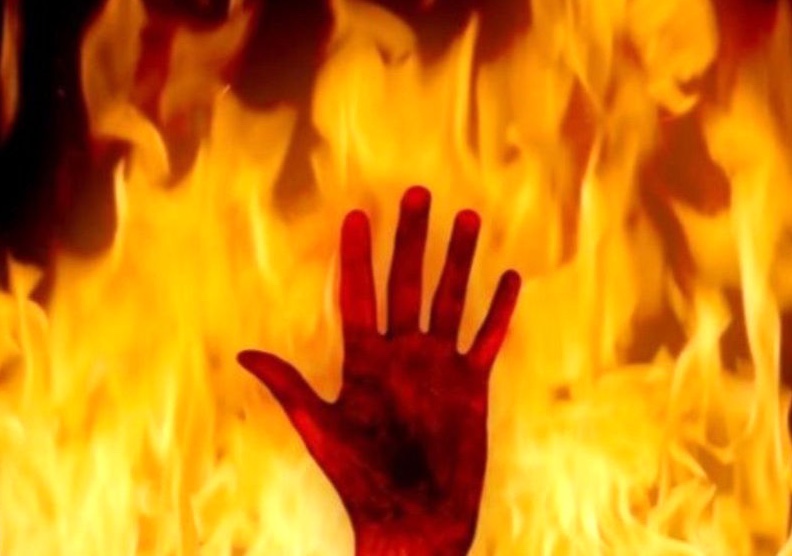خودسوزی نیوشا
![]()
مجید نفیسی
از ناامیدی خود
امیدی ساخت
در ناامیدی،
کبریتی کشید و
خرمنی از آتش شد.1
گفتم: "از زندگی بگو
از مرگ خسته ایم."
گفت:" باید مُرد
تا از زندگی سخن گفت."
گفتم:" جرأت به مرگ بس است
جرأت به زندگی ببخش."
گفت:" تا مرگ، زندگی ماست
از مرگ باید زندگی ساخت."
جمعیت، گرد بر گرد او کشیده بود
و می خواست از ناله های مرگ او
فریاد خشمی بسازد
سرکشیده تر از باروی مرگ.
گفتم:" شهادت بس است"
گفت:" خیانت به آرمان هم."
گفتم:" خونریزی بس است."
گفت:" تسلیم به خودکامگان هم."
جمعیت هوار می کشید
و می خواست از مرگ نیرو بگیرد.
به خود گفتم:
"باز هم نعشی در جلو
باز هم دسته ی عزایی از عقب."
افسوس! ما پاسدار زندگی بودیم
اما پاسداران مرگ
آنقدر کشتند
آنقدر کشتند
که زندگی در دهان ما
طعم مرگ گرفته بود.
پنجه ی سوخته اش را
در دست گرفتم
گفتم:" نیوشا برخیز!
تو دولت عشقی2
این تابوت را به دولت مرگ واگذار."
فریادی کشید:
"من نیوشا نیستم
من ابراهیمِ آزَرَم3
از آتش، گلی ساخته ام."
ملافه ی سفیدی بر او کشیدند
و چشم هایش را
از ما گرفتند.
جمعیت پا به زمین می کوبید
و مشت بر آسمان:
"ای مرگ آفرینان!
هفت سال جنگ بس است
ما صلح می خواهیم
ما صلح می خواهیم."
و نیوشا، انوشا4 بود
از ناامیدی خود
گل امیدی ساخته بود
فراتر از خاک ناامیدی
20 سپتامبر 1987
1ـ در تاریخ 20 سپتامبر 1987 مطابق با 29 شهریور 1366، نیوشا فرهی یکی از کوشندگان جنبش چپ در لس آنجلس و صاحب یک کتابفروشی در محله ی ایرانی نشین وست وود در تظاهراتی که به مناسبت اعتراض به ادامه ی جنگ ایران و عراق و همچنین حضور خامنه ای در مقر سازمان ملل متحد در نیویورک، روبروی ساختمان فدرال در غرب لس آنجلس برگزار شده بود، به سنت راهبان بودایی مخالف جنگ ویتنام خود را آتش زد و سیزده روز بعد در اثر سوختگی های شدید در بیمارستان درگذشت.
من در این تظاهرات شرکت داشتم و همانطور که در شعر آمده پنجه ی سوخته اش را در دست گرفتم. در آن زمان بیشتر فصول کتاب "در جستجوی شادی: در نقد فرهنگ مرگ پرستی و مردسالاری در ایران" را نوشته بودم و به همین دلیل پس از خودسوزی نیوشا بلافاصله با او وارد گفت وگویی ذهنی شدم. این شعر در همان زمان در ویژه نامه ی نیوشا در نشریه "جهان" چاپ شد و سپس در مجموعه ی شعر "اندوه مرز" 1369.
2ـ نیوشا در نامه ی خودسوزی اش مفاهیم سوسیالیستی و عرفانی را درهم آمیخته و از "دولت عشق" سخن می گوید.
3ـ ابراهیم پیامبر پسر بت تراشی بود به نام تارخ. شکل عربی این نام آزر است. ابراهیم بت های پدر را می شکند و گناه آن را به گردن بت اعظم می اندازد. فرعون آتشی فراهم می آورد تا ابراهیم با رفتن درون آن بی گناهی خود را ثابت کند. آتش بر ابراهیم، گلستان شده و آزر نیز یکتاپرست می شود. رجوع کنید به قرآن سوره ی 6 آیه ی 76.
4ـ "انوشا" به معنای نامیرا است.
https://iroon.com/irtn/blog/19697/the-self-immolation-of-neusha/
***
The Self-Immolation of Neusha
The Self-Immolation of Neusha
![]()
by Majid Naficy
In desperation
He created hope
Out of despair.
He struck matches
And turned into a blaze of fire.
I said,
"Tell us about life!
We're tired of death."
He said,
"To speak of life
One must die."
I said,
"Courage to die is enough!
Give us courage to live."
He said,
"Since dying is our life,
"Life must be saved through death."
The crowd circled around him
Turning his moans of death
Into a cry of anger
Taller than the castle of death.
I said,
"Enough of martyrdom!"
He said,
"And enough of repentance!"
I said,
"Enough of bloodshed!"
He said,
"And enough of surrender!"
The crowd cried in fury
To gain strength from death.
I told myself,
"Again a casket in front.
Again a mourning group behind."
Alas!
We were guardians of life,
But the guardians of death
Killed so much.
Killed so much.
That life tasted of death in our mouths.
I held his burnt hand and said,
"Neusha! Get up!
You are the sovereign of love. (2)
Leave this casket to the sovereign of death."
He cried out,
"I am not Neusha!
I am Abraham of Azar. (3)
Turning fire into a flower."
They spread a white sheet over him,
Taking his eyes from us.
The crowd stamped their feet on the ground
And raised their fists into the sky:
"You death-mongers!
Seven years of war is enough.
We want peace.
We want peace."
And Neusha was Anusha. (4)
He had turned his rage
Into a flower of hope,
Beyond the dirt of despair.
September 20, 1987
NOTES
1. Neusha Farrahi, a leftist intellectual and the owner of a Persian bookstore in Westwood, inspired by the tradition of Vietnamese anti-war Buddhist monks, set himself on fire, in front of the Federal building in West Los Angeles, on September 20, 1987 and died thirteen days later. This action took place in a demonstration against the Iran-Iraq war and the Iranian President's visit to the Un in New York. I was among the demonstrators and as described in the poem took his burned hand in my hand and had a mental dialogue with him about the cult of martyrdom. By that time, I had written most chapters of my book In Search of Joy: A Critique of Death-Oriented and Male-Dominated Culture in Iran. The Persian version of this poem was first published in a special issue of Jahan magazine (November 1987) dedicated to Neusha, and later in my collection of poems Sorrow of the Border. The English version of this poem first appeared in my collection of poems Muddy Shoes (Beyond Baroque Books 1999).
2. In his death note, Neusha intermingles socialism with mysticism and speaks of the "Government of Love".
3. According to the Koran, VI:76 Abraham, the prophet was forced by the Pharaoh to enter a fire as an ordeal which immediately turned into a garden. His father, Azar, who is called "Terah" in Hebrew, was an idol-maker.
4. The word "anusha" in Persian means "immortal".
https://iroon.com/irtn/blog/19697/the-self-immolation-of-neusha/


هیچ نظری موجود نیست:
ارسال یک نظر